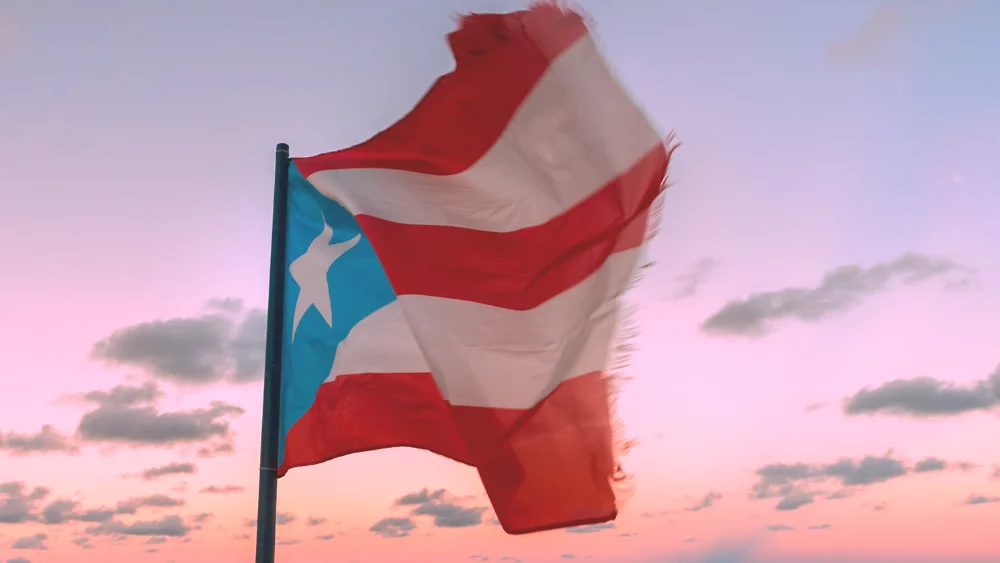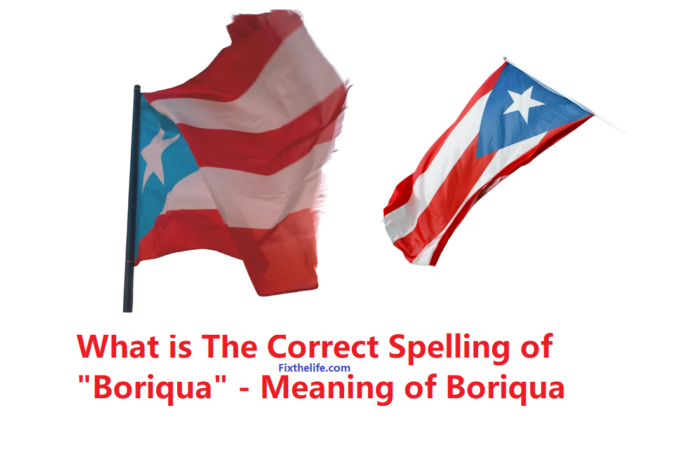The correct spelling of Boriqua remains uncertain, leaving us only to speculate. The utilization of the letter “Q” in its spelling is derived from “boriquen,” the initial indigenous designation bestowed upon Puerto Rico by our Taino Indian ancestors. Curiously, I find myself alternating between employing the letter “C” and “Q” when writing it, embracing whichever choice whimsically drifts my way for the day. The meaning of BORICUA is a native of Puerto Rico or a person of Puerto Rican.
Lets talk more on the word Boriqua or Boricua, its correct spelling, meaning and the history.
Boriqua or Boricua?

The term “boricua” is the Spanish spelling, while “boriqua” is the English equivalent. The inclusion of the letter “q” in “boriqua” originated from the word “boriquenio,” which refers to the indigenous people of Puerto Rico. Hence, both spellings are considered valid.
To commence, the choice of spelling is entirely subjective and adaptable. However, the accurate rendition is “BRIQUA.” Why, you may wonder?
Allow me to elucidate. The original name of the island is “boriquen,” a term bestowed upon it by our indigenous forebears, the Taino Indians.
Subsequently, the arrival of European colonizers led to the imposition of alternative designations. Then, as the Spanish influence took hold, it transformed from “porto rico” to “puerto rico.”
However, within the confines of this transformation, the inhabitants of the land contemplated their own identity and devised a remarkable alteration.
Drawing inspiration from the Tainos, they ingeniously derived “BORIQUA” as a symbol of their heritage. Naturally, the narrative encompasses more intricacies, but this concise adaptation was both accessible and enjoyable to convey.
Boriqua Meaning
The meaning of “Boriqua” is rooted in the history and culture of Puerto Rico. It refers to the original name of the island, given by the Taino Indians, who were the indigenous inhabitants of Puerto Rico. “Boriqua” means the concepts of origin, indigeneity, and identity.
It represents the blending of Spanish, African, and indigenous cultures that form the unique heritage of Puerto Ricans.
The spelling variations, such as “Boriqua,” “Borikua,” or even “Boricua,” do not diminish its significance.
Ultimately, the term encompasses a sense of pride and connection to the ancestral roots and rich diversity of Puerto Rico.
ALSO READ: Boriqua Morena Meaning
How to Pronounce Boriqua?
- Bo·ri·cua
- bȯ-ˈrē-kwə

ALSO READ: Puff Mamma 1998 – Meaning and Definition
The Rich History of the Term ‘Boricua’ and Puerto Rican Pride
The term “Boricua” resonates in numerous reggaetón tracks and is commonly used in the vernacular of certain Latino individuals. Nonetheless, for English speakers or those unfamiliar with Latino culture, this expression may be entirely unfamiliar. Hence, the question arises: What does “boricua” mean?
Who is a “Boricua”?

Puerto Ricans, commonly referred to as “boricuas,” are individuals born in Puerto Rico. The majority of boricuas reside either on the island itself or in the United States.
Puerto Rico holds the status of an unincorporated territory of the United States, functioning as a nation with its own self-governing system, yet remaining under the sovereignty of the United States.
The definition of “boricua” is not as straightforward, as it does not encompass all Puerto Ricans.
In order to be recognized as a true “boricua,” it is not sufficient to simply be born in Puerto Rico; rather, one must have ancestral roots that have been established on the island for numerous generations.
The exact number of generations required is not precisely defined, but from a cultural standpoint, it is commonly understood that at least two generations need to have resided in Puerto Rico to be referred to as “boricuas” rather than simply Puerto Ricans.
The term “boricua” emphasizes a sense of pride in one’s ethnicity rather than solely one’s nationality.
In contrast, residing in Puerto Rico is not a prerequisite to being considered a Puerto Rican. According to certain data, a significant portion of the Puerto Rican populace residing in New York has never set foot on the island.
Similarly, substantial Puerto Rican communities can be found in various locations such as the U.S. Virgin Islands, the Dominican Republic, Canada, and Mexico.
ALSO READ: 100+ BEST PUERTO RICAN TATTOO IDEAS THAT WILL BLOW YOUR MIND
Where Does The Term “Boricua” Come From?
The term “Borinquén” originates from the aboriginal language and was initially used to refer to the magnificent land of Puerto Rico, symbolizing bravery and nobility.
Over time, the written representation of “Borinquén” in Spanish has undergone various changes. During the 1800s, it was spelled as “Boriqué,” with the pronunciation of “qu” resembling “cu,” resulting in “Boriqüé.”
Additionally, historical maps and literature have depicted alternative spellings such as “Boiiqua” or “Boiicua.”
The term “Boricua” made its first appearance in 1844, within the Spanish rendition of Jean-Antoine Letronne’s renowned geography book titled “Curso completo de Geografía Universal Antigua y Moderna.”
This publication, widely read during that era and subsequently translated into multiple languages, played a pivotal role in introducing the term.
It was in 1854 when Francisco Pastrana, a notable geographer from the region, embraced and incorporated “Boricua” into his educational work entitled “Catecismo de Geografía de la Isla de Puerto-Rico,” designed for primary education.
Through Pastrana’s influential book, the term gained popularity as a geographical descriptor for the island and eventually became associated with its inhabitants.
However, according to alternative beliefs, the term “Boriqua” is said to have originated from the Arawakan language, specifically from the word “boricuá,” which was used to describe individuals who indulged in consuming crabs.
It is noteworthy that the indigenous Taíno population, residing on the island at the time, adopted this term to refer to themselves.
Throughout history, the island welcomed a diverse array of European colonizers hailing from France, Spain, Corsica, Germany, Scotland, and Portugal.
Alongside them, individuals from the Igbo and Yoruba tribes in Africa were forcibly brought as enslaved laborers to toil the land. As time passed, immigrants from Lebanon and China also found their place on the island.
Sadly, these influxes of different populations had a detrimental impact on the indigenous Taíno people, leading to a significant dilution of their numbers as a consequence of colonization.
More About “Boriqua”
“It is indeed accurate, as Idejesus mentioned, that the exact spelling preferred by the Taino Indians remains uncertain. However, let us momentarily consider the Spanish perspective.
If the Tainos referred to the island as Borinquen, then logically, we would be Boriquas, as it would necessitate the use of the letter ‘q’ to accurately convey its pronunciation, rather than Borincen or Boricen.
Personally, I believe the original spelling ought to have employed the ‘q,’ but it seems that the Spaniards altered it.
Subsequently, the island came to be called Porto, borrowing from the Italian language (due to Columbus’ Italian heritage, with his last name being Colombo), and ‘rico’ in Spanish signifies ‘puerto’ or ‘pier’ in English.
Moreover, ‘rico’ was appended because they anticipated discovering gold, thus associating wealth with the island.”
But it is crucial to always bear in mind that Boricua, whether spelled as “qua” or “kua,” carries profound significance as it harkens back to the original appellation bestowed upon the island by the Taino people.
In my perspective, Boricua encapsulates notions of heritage, indigeneity, and personal identity. The spelling itself matters less than the inner strength one feels in relation to it and the manner in which one embodies their Boricua identity.
It signifies the fusion of Spanish and African cultures with the indigenous roots, unaltered by the influences of foreign settlers. Some individuals identify as Boricuas, while others prefer the term “puertorriqueños.”
However, these distinctions hold no real importance. Instead, one should follow their heart and embrace their Boricua essence, regardless of how it is spelled or whether they choose to identify as Puerto Rican.
What truly matters is the unwavering representation of being a true Bori, where the rhythmic beats of the drums, reminiscent of African and indigenous traditions, echo within one’s heart.
Whenever the sound of a drum reaches my ears, it instantly conjures images of my cherished “Isla del Encanto.” Embrace the essence of Bori, and when someone inquires, simply pronounce it without the need for spelling. A genuine Bori will grasp the profound meaning concealed within.
Key Takeaways
- The correct spelling of “Boriqua” remains uncertain, leading to speculation.
- Both “Boricua” and “Boriqua” are considered valid spellings.
- The term originated from the indigenous name “Borinquen” given to Puerto Rico by the Taino Indians.
- “Boriqua” represents concepts of origin, indigeneity, and identity.
- Puerto Ricans, known as “boricuas,” are individuals born in Puerto Rico or with ancestral roots on the island for multiple generations.
- The term emphasizes pride in ethnicity rather than just nationality.
- The written representation of “Borinquén” in Spanish has evolved over time.
- “Boricua” first appeared in a geography book in 1844 and gained popularity as a descriptor for the island and its inhabitants.
- The spelling variations do not diminish the significance of the term.
- Pronunciation of “Boricua” is similar to “bo-ree-kwah.”
- Boriqua symbolizes the blending of Spanish, African, and indigenous cultures in Puerto Rico.
- “Boricua” evokes a deep connection to the ancestral roots and rich diversity of Puerto Rico.
- The term holds personal meaning and is not solely dependent on its spelling.
- The essence of being a “boricua” lies in embracing one’s heritage and identity.
- The rhythmic beats of drums evoke thoughts of the cherished “Isla del Encanto” (Island of Enchantment).
- The term signifies pride and a profound sense of belonging to the Puerto Rican culture.
Boriqua – Boricua
The Spanish spelling is “boricua” but “boriqua” is the English term. The meaning of BORICUA is a native of Puerto Rico or a person of Puerto Rican




